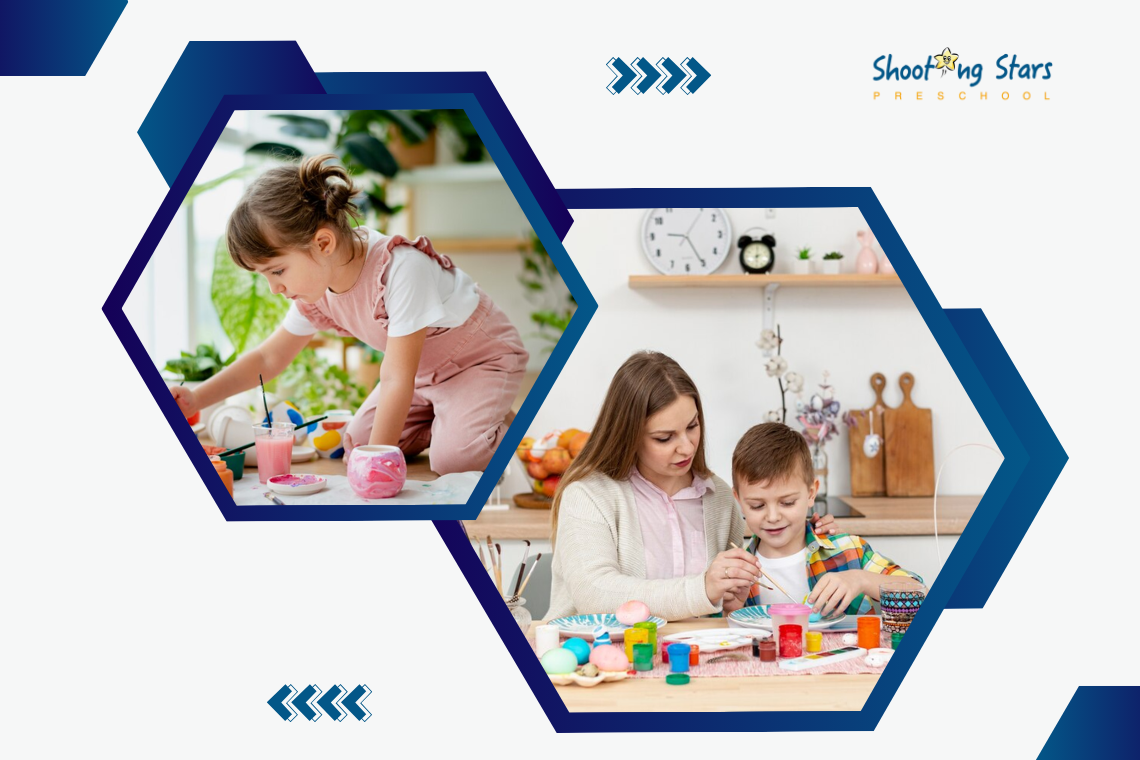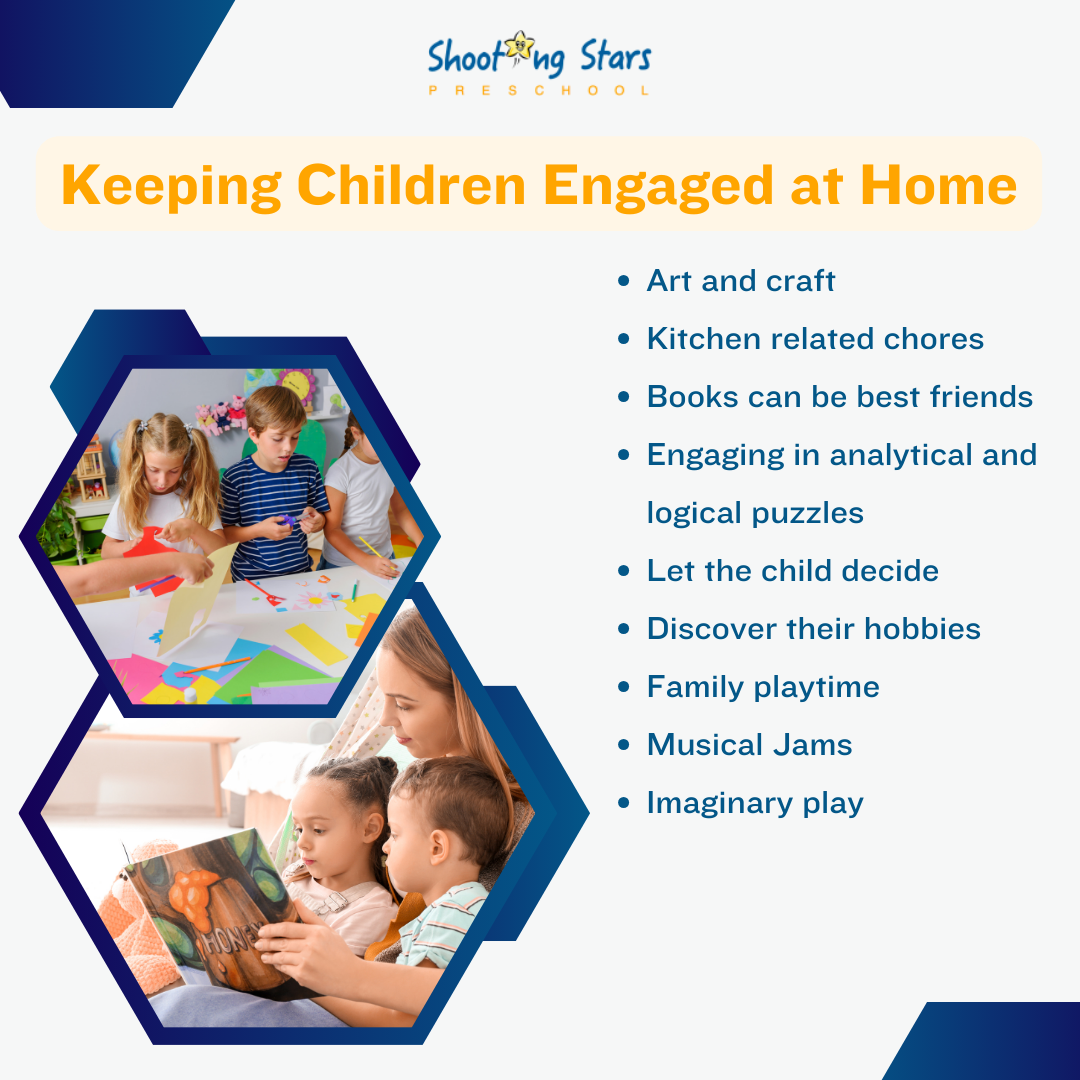|
Toddlers tend to get easily distracted or bored, particularly when they are at home or in enclosed spaces. It's not always an ideal situation to work from home without childcare while your kids are around, but it's something that happens. Whether your little ones have a day off from school, there's a snow day, or someone is feeling unwell, there are many reasons why you may need to get work done with them in the house, from toddlers to school-age kids on extended holidays. In such situations, it takes a lot of effort to keep your child happy and occupied.
Preschool in Dublin offers discrete, fun-filled activities for nursery and kindergarten kids to dive into adventures.
Keeping Children Engaged at Home As tough and tasking as it looks to have toddlers or grown-ups in the house, with innovation and proper planning, their boredom can be turned into a fun time. Mentioned below is a list of activities that could engage and make the free time of kids productive, fun, and sometimes thoughtfully fruitful. 1. Art and craft
Encouraging your child's creativity is important. You can do this by providing them with age-appropriate arts and crafts materials and involving them in activities that match their ability and skill level. It's important to acknowledge their effort and encourage their creative expression rather than expecting perfection.
To make it easier, keep a supply of arts and crafts materials handy. Here are a few ideas: drawing and painting, clay modeling, papercraft and origami, beadwork, basket weaving, sewing and knitting, carpentry, and fruit and veggie art.
Art and craft activities not only nurture your child's creativity but also help them focus, pay attention to details, and improve their hand-eye coordination, fine motor skills, and color sense.
2. Kitchen related chores
While you are cooking, younger children can help by washing vegetables and rolling out their rotis. Older children can assist with cutting, prepping, and even cooking. The key is to involve them in planning the menu and shopping. Encourage older children to experiment with recipes.
When you are doing laundry or cleaning a room, ask your child to pitch in and help. It's important to appreciate your child's help and not expect them always to do it perfectly.
As your child helps with chores and cooking, they will learn valuable self-help skills. Furthermore, learning to cook will help them become more independent and self-confident. As a bonus, when your child helps with cooking, even a fussy eater can become less picky!
3. Books can be best friends
Encourage your child to explore the world of books, from fantasy to adventure, thrillers to biographies, factual to how-to books, and more. Keep a variety of books easily accessible for your child to choose from and read at any time. Make reading a daily habit by incorporating it into your child's bedtime or evening routine. For younger children, read to them regularly. Please encourage your child to write and illustrate their storybook or biography through journaling. Reading helps improve vocabulary, comprehension, storytelling, and writing skills while also fueling your child's imagination. Once your child is engrossed in a book, it can keep them occupied for hours.
4. Engaging in analytical and logical puzzles
It's important to challenge your brain occasionally to keep it healthy, growing, and sharp. However, it's essential to choose challenges that are at your level to stay interested and feel successful. If it's too easy, you'll be bored, and if it's too difficult, you won't want to try. Here are a few thinking activities that you can try:
5. Let the child decide
If your preschool child complains of boredom, there's no need to feel the pressure to plan or direct their play. Instead, give them the time and space to find their ways to entertain themselves. They might find toys to count, coins to sort, paper to cut, or nails to paint. Alternatively, they might chat with a family member or lie on the sofa and daydream.
Consider setting up a special area where your child can store their favorite toys, books, and other items to play with under your guidance.
Research has shown that occasional bouts of boredom stimulate the brain and foster creative thinking. So, don't be afraid to let your child experience some downtime without constant stimulation.
6. Discover their hobbies
Indoor hobbies can include a wide range of activities, such as stamp and coin collecting, photography, archaeology, cooking, gardening, painting, and dancing, among others. It's important to support your child's interests and provide them with the necessary training and materials to pursue their hobbies. When your child is passionate about something, they will likely give their best effort, which can lead to success and increased confidence in all areas of their life.
7. Family playtime
There are numerous fun games that families can engage in, ranging from board games to card games, from chess to backgammon, from hiding and seek to blind-man buff, and from random music quizzes, family movie nights to dumb charades. Spending quality time together as a family, without the distraction of gadgets, work, or chores, can strengthen the parent-child connection. Family time, in turn, builds your child's trust in you, encourages cooperation, and reduces conflict.
8. Musical Jams
Music has the power to get your child moving, dancing, and grooving. It can also have a calming and soothing effect. Encourage your child to turn on their favorite music and sing and dance along, or they could sit quietly and relax to the rhythmic sounds of the music. If your child plays an instrument or sings, encourage them to play or sing their music. Music has the power to relieve stress and unwind the mind. It livens the spirit and boosts brain development.
9. Imaginary play
Pretend play is crucial, especially for young children. It allows them to be completely absorbed in a fantasy world of their own, such as hosting a tea party for their dolls or pretending to be a superhero, saving the world from a monster. You can encourage your child's imagination by providing them with old cardboard boxes, scarves, plastic containers, and dress-up clothes. Watch as your child transforms into an astronaut blasting off on a rocket or a fairy queen living in a magical house.
As your child engages in pretend play, they often relive their real-world experiences, such as acting like their teacher, doctor, or even you. This safe space allows them to express their emotions and feelings through play. You can observe their conversations and gain insight into their inner world, but it's best not to intervene unless invited to join in their pretend world.
Conclusion
It is important to create opportunities for your child to explore different activities and encourage their passions and interests. Let your child take the lead and help them balance the use of technology with real-world experiences and connections. Research has shown that spending quality time together without the distraction of gadgets is crucial for building a strong and trusting relationship between parents and children.
Comments are closed.
|



